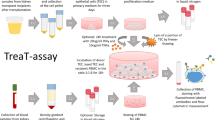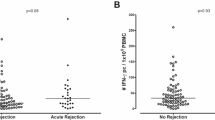Abstract
Development of donor-specific proliferative hyporeactivity has been evaluated in many studies for its usefulness in identifying transplant recipients at low risk of immunological complications. These studies often result in controversial conclusions, however. The authors claim that the discrepancy in the predictive value of mixed lymphocyte culture- (MLC) reactivity might partly be due to differences in presentation and interpretation of results. The purpose of this study is to investigate the usefulness of a normalized evaluation of antigen-specific donor-reactivity in a small number of kidney transplant recipients. This could then serve as a basis for an extended clinical study. Ten cadaveric kidney recipients were tested for proliferative reactivity to donor- and third-party antigens up to 20 months posttransplantation. Expressing donor-specific reactivity as a relation between the percentage of pretransplant responses towards donor splenocytes and the percentage of pretransplant responses towards third-party donor cells should minimize influences of e. g. uremia, current immunosuppression or infections on the evaluation of specific reactivity and thus should allow an evaluation of the donor-specificity of T-cell alloresponses independently of fluctuations in global responsiveness. Four of ten recipients acquired a state of donor-specific hyporeactivity ( < 75 % relative specific reactivity) at 20 months posttransplantation (61 ± 12 %, mean ± SD). Six patients were classified non-hyporeactive (98 ± 10 % mean relative specific reactivity). Relative specific reactivity did not correlate with the levels of general reactivity. Three of the four hyporeactive and four of the six non-hyporeactive patients developed acute rejection. Stable graft function at 20 months posttransplantation (serum creatinine ≤ 2 mg/dl) was not closely related to the reactivity status, as five of eight patients with well-functioning grafts did not develop relative specific hyporeactivity. One recipient with chronic rejection was classified hyporeactive. One non-hyporeactive patient lost his graft due to non-immunological causes. Our data suggest that posttransplant relative specific reactivity does not predict acute rejection. Downregulation of donor-specific reactivity might not be a prerequisite for stable graft function but could help identifying recipients who require less immunosuppression. This, however, remains to be established in a prospective immunosuppression-weaning study.
Similar content being viewed by others
Author information
Authors and Affiliations
Additional information
Received: 2 November 1998 Revised: 11 October 1999 Accepted: 22 February 2000
About this article
Cite this article
Böhmig, G., Säemann, M., Bergmann, M. et al. Long-term evaluation of proliferative donor antigen-specific reactivity in cadaveric kidney transplant recipients. Transpl Int 13, 187–193 (2000). https://doi.org/10.1007/s001470050685
Issue Date:
DOI: https://doi.org/10.1007/s001470050685




